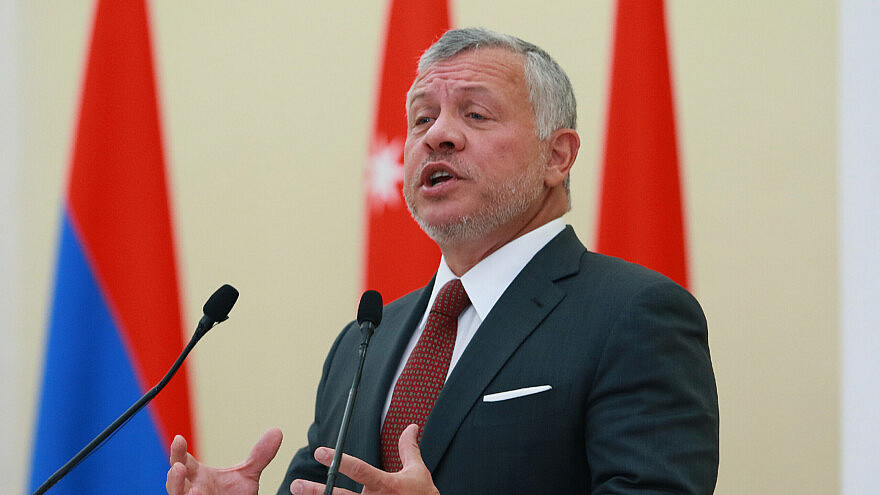Assad drags feet on earthquake relief in Syria for political advantage

Collapsed buildings in Kahramanmaraş Turkey, following a deadly 7.8-magnitude earthquake that hit the country in the early morning hours of Feb. 6, 2023. Source: Screenshot.
by Yoni Ben Menachem
(JCPA) — Syrian President Bashar Assad and his wife Asma lowered their media profile following the great earthquake that hit Turkey and Syria on Feb. 6. They completely disappeared from the media scene, even though Asma Assad controls the humanitarian organizations in Syria.
Four days after the earthquake, following criticism on the Syrian street, Assad and his wife visited the city of Aleppo, which was hit by the quake, and met with the injured in local hospitals.
The Syrian president refrained from declaring a state of emergency in Syria or declaring it a disaster area, and did not even declare a national day of mourning for the thousands of Syrians killed.
It seems that Assad, who massacred hundreds of thousands of Syria’s Sunni Muslims during the country’s civil war, was not shaken by the estimated 4,000 people earthquake victims. Rather, he is attempting to take advantage of international sympathy to achieve the lifting of Western sanctions.
U.S. Secretary of State Antony Blinken revealed that several Western countries had offered aid, but that Syria had rejected it. Assad’s government set a condition that any aid to the Syrian people would go through the Syrian government — including aid to earthquake victims in areas not under the control of the Assad regime. On Feb. 10, Deutsche Welle reported that Assad, “in a surprise move,” would agree to permit aid to flow to regions not under state control, i.e. through rebel-controlled and Kurdish areas.
The Biden administration is being very careful, however, and insists on sending the aid directly to those who need it in Syria and not through the corrupt regime of Bashar Assad.
Syrian social media documents theft of aid
Residents of Syria report that foreign assistance to earthquake victims from Arab and European countries is being hijacked at the airports by government agents, and, in some cases, is being sold on street corners. Twitter Hashtag “#Assad_Loots_Aid” presented reports of piles of food basics marked “not for resale,” or meat donated by the United Arab Emirates, for sale on the streets, far from the devastated regions.
Official Syrian media accused the international community of preventing the legitimate Syrian government from treating the victims of the earthquake because of the sanctions it has imposed on the regime. Syrian personalities and artists launched a campaign on social media calling for the lifting of sanctions. The regime used the same tactic during the height of the pandemic.
Assad is looking for international legitimacy and claims that the American and European sanctions paralyze the regime, preventing it from effectively treating the victims of the disaster.
However, the U.S. Treasury Department issued a six-month sanctions exemption on Feb. 10 to facilitate the provision of humanitarian aid to Syria.
Before the earthquake, U.N. reports stated that 90 percent of Syrians lived beneath the poverty line, and were in need of economic, medical and humanitarian aid. Approximately 12.4 million people — some 60 percent of Syria’s population — suffered from food insecurity, made worse by grain shortages because of the war in Ukraine. Syrians live in a state of horrible poverty and a shortage of medicine.
Some four million people rely on aid that cannot enter the earthquake area because of the closing of entry routes due to physical damage or political obstinacy.
Sanctions vs. the narco-state
To get around the sanctions, the Syrian regime has turned to the dangerous economic alternative of large-scale smuggling and drug trafficking, especially of the drug Captagon. General Maher al-Assad, the president’s brother and commander of the Fourth Division of the Syrian army, is considered the biggest drug dealer in Syria, with Captagon now being Syria’s largest export.
The Syrian regime does not control the Idlib and Aleppo governorates, which are the main areas affected by the earthquake. Some Muslim countries, such as Egypt, Lebanon, Jordan, and Iran, and some European countries have already transferred aid to Syria, but it is not clear if it will reach those who need it.
The earthquake in Turkey and Syria revealed how isolated the Syrian regime is, from both an Arab and international point of view. President Assad is desperately trying to take advantage of the terrible disaster, having expelled about five million Syrian citizens during the civil war.
The United States and the European Union countries are doing everything they can so that aid reaches those in need, but Assad and the corrupt gang surrounding him are the ones who control the country.
This is one of the greatest tragedies of the Syrian people. The real danger to the citizens of Syria is not the earthquake that claimed the lives of several thousand people; the far greater danger is the continuation of Bashar Assad’s rule.
Yoni Ben Menachem, a veteran Arab affairs and diplomatic commentator for Israeli radio and television, is a senior Middle East analyst at the Jerusalem Center for Public Affairs. He served as Director General and Chief Editor of the Israel Broadcasting Authority.
Originally published by the Jerusalem Center for Public Affairs.



